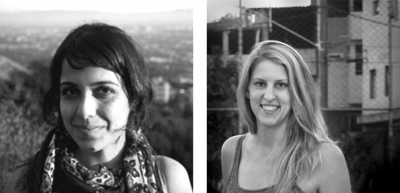
December Student Spotlight: Karin Shankar and Kirsten Larson
From the Theater, Dance & Performance Studies news page: http://tdps.berkeley.edu/tdps-news/
December 2015
Karin Shankar’s interest in cities can be traced to growing up in Mumbai, a city with a population of about 20 million, the biggest film industry in the world, and a vibrant tradition of theater. This early introduction to the intersection of performance and city life was the seedling for Shankar’s latest endeavor, the web-based publication P[art]icipatory Urbanisms. Says Shankar, now a PhD candidate in Performance Studies at UC Berkeley, “The interdisciplinary study of cities today is so important. We live in a moment in which the world is more urban than ever before. As a scholar, I’m passionate about thinking about many aspects of urban space—the impact of rapid urbanization, public art and performance, marginalized spaces in the city, raced and queer spaces, and power and networks in the city…Performance is a very useful lens to think about these issues.”
P[art]icipatory Urbanisms began when Karin and her collaborator Kirsten Larson, a graduate student in Architecture and City Planning, were awarded a grant from the Mellon Foundation’s UC Berkeley Global Urban Humanities Initiative to create and edit the publication. The two scholars decided to focus on the metropolises of New Delhi, India and São Paulo, Brazil due to their similar size and positions in the global urban imaginations, the histories of participatory urban activity in both spaces, and for their own personal and research connections in the two cities.
In the summer of 2014, Karin traveled to New Delhi and Kirsten went to São Paulo to interview participatory urban practitioners and collectives, including urban NGOs, performance and art collectives, journalists, city planners and builders, activists, waste-workers, educators and graffiti muralists. Karin says, “We wanted to see the various ways in which people defined and practiced ‘taking part’ in their cities, across the realms of art and politics in both these spaces.” She continues, “Our interviewees spoke of their incredibly creative and political urban initiatives, [ranging] from mobile performances of poetry and theater, to citizen journalism on gentrification, to radical neighborhood education initiatives. In São Paulo, for instance, a feminist dance collective, Coletivo Pi, is exploring how to create ‘urban kindness’ through movement and dance works in the city.”
After returning to UC Berkeley, Karin and Kirsten began to compile and condense their materials. P[art]icipatory Urbanisms officially launched in October 2015 and is comprised of two components. The first is an online bilingual (Brazilian Portuguese and English) publication of twenty interviews from São Paulo and New Delhi. To show connections between the cities, the interviews are formatted as a diptych—two interviews, one from each city, are laid side by side. Karin explains, “In visual art, a diptych is often used to extend the canvas, and draw parallels between two sides. We chose this conceptual format so that readers and interviewees from the two cities could form unexpected connections, and see productive relationships in the various art, performance and activist initiatives across the two cities.”
The second component of the project is a peer-reviewed anthology of scholarly articles on the themes of urban participation and its relationship with politics and aesthetics. After putting out a call for submissions, Karin and Kirsten received over 70 contributions from emerging and established scholars within the US and from across the globe, and ultimately chose 18 for the publication. The research articles address a variety of current topics, including the occupation of a theater in Athens during the Greek economic crisis, the ‘right to housing’ protests in Madrid and Rome, and Black urban studies and its relation to the #BlackLivesMatter movement.
The online publication, and the accompanying limited print-run, of P[art]icipatory Urbanisms was received well, with over 4,500 hits on the website in the first week and academics writing in to say they will refer to the anthology as a resource for classes on public space, urban performance and activism. In addition, the publication facilitates creative exchange and advocacy for the interview participants. Explains Karin, “The groups in São Paulo and New Delhi will be using the publication in their advocacy initiatives—which is important to us as we wanted the publication to be useful. They are also enthusiastic about making connections with artists and activists in their own city, as well as from this other city, 9000 miles away, that is facing similar urban challenges.”
Karin will be graduating this spring and is currently hard at work completing her dissertation, which examines the work of five contemporary artists and performers in New Delhi and looks at how they offer aesthetic tools to contemplate rapid urban change. Karin’s experience with P[art]icipatory Urbanisms is informing her dissertation, and has also opened new research avenues and provided practical experience in editing an anthology. Reflecting on what she learned from the project, Karin says, “Seeing the ideas that emerged from the interviews was inspiring. In the anthology, we got to work closely with 18 authors. Aside from learning about their compelling research, we learned so much about the editorial and publication process. This was a wonderful experience of collaborative scholarship.” Though the online anthology may be complete, Karin has no plans to conclude her research: she and Kirsten are thinking about curating an exhibition based on P[art]icipatory Urbanisms in São Paulo next fall.
View P[art]icipatory Urbanisms
P[articipatory Urbanisms was sponsored by the UC Berkeley Global Urban Humanities Initiative.
